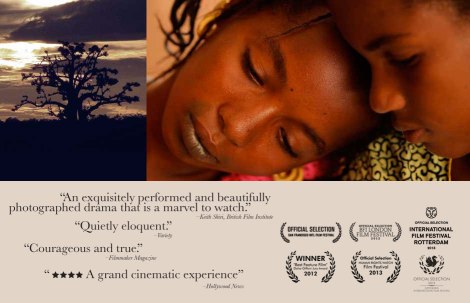
Alexi Pappas is an award-winning playwright, athlete, and screenwriter. Her feature film debut, Tall as the Baobab Tree (original title: Grand comme le Baobab), was awarded “Best Narrative Feature” at the Doha-Tribeca Film Festival, and continues to win acclaim on the international festival circuit. The film, directed and co-written by Jeremy Teicher, was an Official Selection of the 56th Annual San Francisco International Film Festival, where it showed to significant regard in May 2013. Ms. Pappas spoke with Sean Malin of CineMalin: Film Commentary about getting into the screenwriting game, her life as a runner in Oregon, and where the success of her first script may lead. This interview has been transcribed, compressed, and edited from audio for publication.
Sean Malin: You co-wrote Tall as the Baobab Tree with Jeremy Teicher. What did you bring to the table in your collaboration?
Alexi Pappas: As storytellers, Jeremy and I have different strengths. He’s really good at seeing narrative; he can visualize plot. My strength lies with the characters and the relationships they have with one another. Where I feel I contributed most to the film was in bringing to life these very real relationships between the characters, and especially between the two sisters [Coumba and Debo, played respectively by Dior and Oumul Ka] in bringing realism to their sweet-hearted relationship.
SM: Was their relationship drawn from your personal or family life, or was it just off-the-cuff screenwriting?
AP: You know, I don’t have any sisters myself, but I am invested in those types of relationships and I’m deeply connected to my family. I think [those scenes] do come from my emotional core.
SM: The actors portraying those two characters are real-life sisters. Did you, like [Mr. Teicher], have any personal relationships with them offscreen?
AP: I didn’t know them, but I feel that I got to know them through Jeremy’s stories and through his documentary This is Us (2011). I certainly learned a lot seeing them tell their own stories. It was a sort of, “If this, then that…” thing for me: if I took them in as real people telling those stories, then we could invoke them in the narrative fiction we came up with for the feature.
SM: This is your feature debut – can you tell me about your dramatic background until this point? I’ve been told that you are an award-winning playwright.
AP: Oh, uh…
SM: There’s no room for humility here! You’re on the record.
AP: Well, it’s true in the Dartmouth books. I have a background in playwrighting, some screenwriting in school, and, most strongly, in poetry. My study of poetry, in which each word is so important, allows me to look at my work critically. I realized that you should never waste words. Likewise, you can have fun with words – in poetry, especially, I like destabilizing words and making you really look at them. Having that space allows me to look at dialogue in a different sort of way.
SM: How similar is this Realist screenplay to the plays you have written?
AP: The playwright I look up to most is Sarah Ruhl; what her characters say is often rooted in A reality, and her dialogue is often so raw and beautiful. But the worlds of her plays are just as often fantastical or whimsical, not at all realistic. When I write [plays], I try to get the same effect.

SM: Do you think your attentiveness to dialogue might have been difficult for the first-time actors at the center of the film? If you wrote destabilizing dialogue, did the actors struggle with it?
AP: For this film, we did not actually write the specific words we wanted the characters to say. Rather, we wrote the outline of what we wanted to come across in each scene. For example, the way I would tell my sister – if I had one – that I love her is that she should do this or that thing. But surely, for the villagers [of Sinthiou Mbadane, who played the parts], we were required to bring out the reality that Jeremy had gotten to know. I do think that that script will be different from others I write in the future, where I may write the exact wording instead of the essence of what I imagine might happen.
SM: As someone with such diverse faculties – you are a professional athlete, a poet, and a screenwriter – are you concerned that, while you gain traction and notice in the film industry for Baobab, you may have to sacrifice one or more of the elements that compose your current lifestyle?
AP: No, because I think the filmmaking and the running complement each other so well. In both disciplines, people tend to think, “Certain runners are runners because they are gifted,” or, “Writers are just naturally gifted,” but I think both crafts are such that they can be learned and practiced for. On the physical and mental scales, they balance each other out for me. I’ve so far found ways to be at running practice when I need to be, and when to be a writer and filmmaker when I’m there. My hope is to marry those pursuits, especially when I finish school, and I don’t see them butting heads. Most runners have to look for something else to do because you can’t run twenty-four hours a day. Similarly, for me as a creative person, I like that physical, competitive outlet.
SM: I understand how one might practice running. How do you practice the craft of screenwriting, specifically?
AP: One of my professors taught me to find a way into a certain mindset. For me, I have certain songs that help me get into my writing place. It’s almost like muscle memory or a special kind of notebook; once you open that notebook with songs, you start writing. I also dedicate a solid chunk of time, not twenty minutes here or there. I get into an almost meditative state trying to find the voices of the characters.
SM: What was some of the music you used to work on this film? I’d love to have your songs lined up in a playlist with Jay Wadley’s SoundCloud of tracks from the film.
AP: That would be funny. A lot of Beach House, actually. Tennis; Best Coast; sometimes Lana Del Rey. Music that’s reminiscent of happy memories in my life can really calm me. Sometimes, if I’m really feeling a song, I would put it on repeat and it would get me through a whole scene.
SM: Do you see yourself going outside of co-screenwriting or screenwriting in the general filmmaking process in the future?
AP: Jeremy and I have another script in the works that’s set in the world of long-distance running. It’s inspired by my experiences, though the plot is not my own and the accounts are not autobiographical. And, you know, I may even act in it *laughs*. I have a background in improv theatre, and that’s another piece that has helped with the writing. It also keeps acting in the back of my head.
SM: Will this film be in a similarly improvised style to Tall as the Baobab Tree?
AP: Definitely not. We will have a script. We are graduating to full dialogue…probably. *laughs* It will be as much a working, written script as any. And I feel I can fit in with the world, or this world of females in film, or… –
SM: From my perspective, you’re in the thick of that world. There’s a real dichotomy between women in cinema and men in cinema, and with this film you can safely say that you occupy it.
AP: Certainly. In my involvement with this film, I was just writing and working with Jeremy. But in my experiences with improv comedy and with running, interestingly enough, I’ve learned that the identity of Woman is what you make it; in improv, especially, anyone is anyone, you know? In running, women sometimes are feminine in some ways and not in others. I really think that mix helps me to be more dynamic as a woman-in-cinema.

